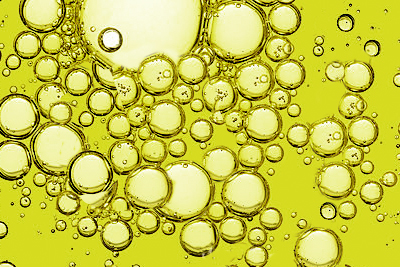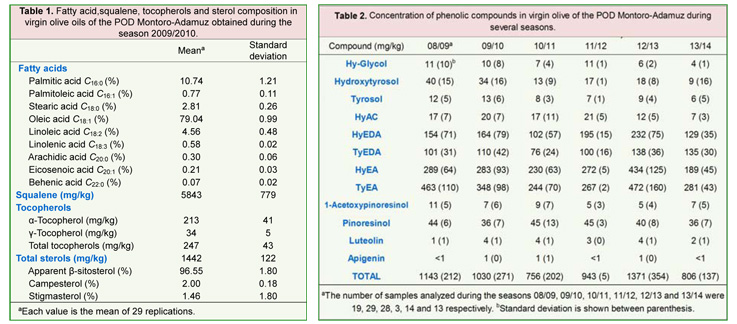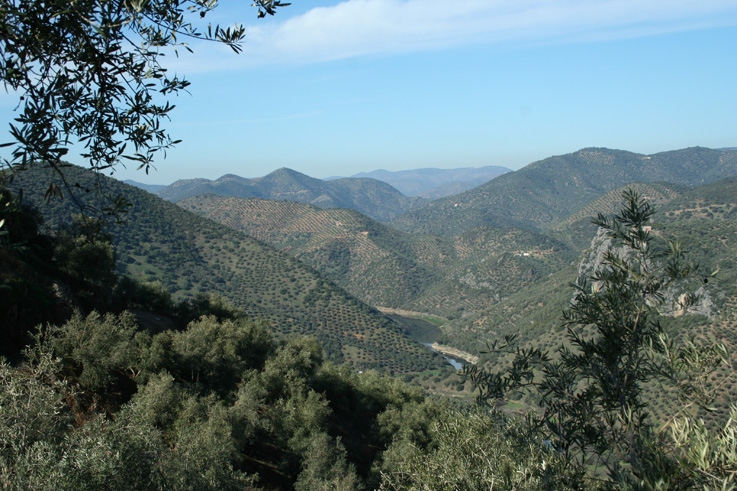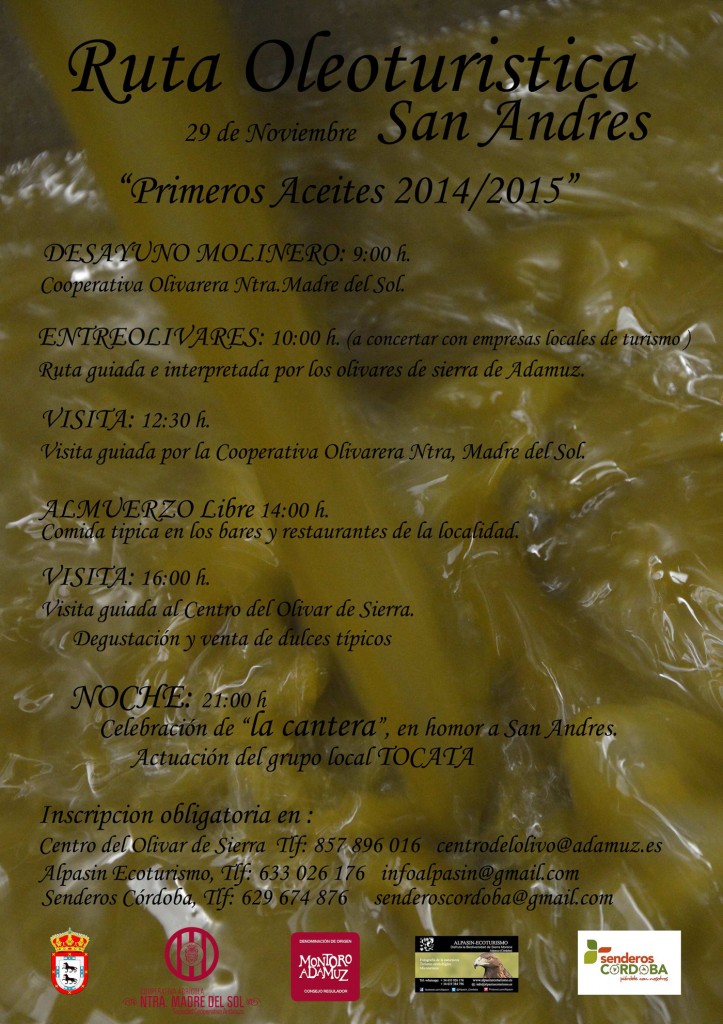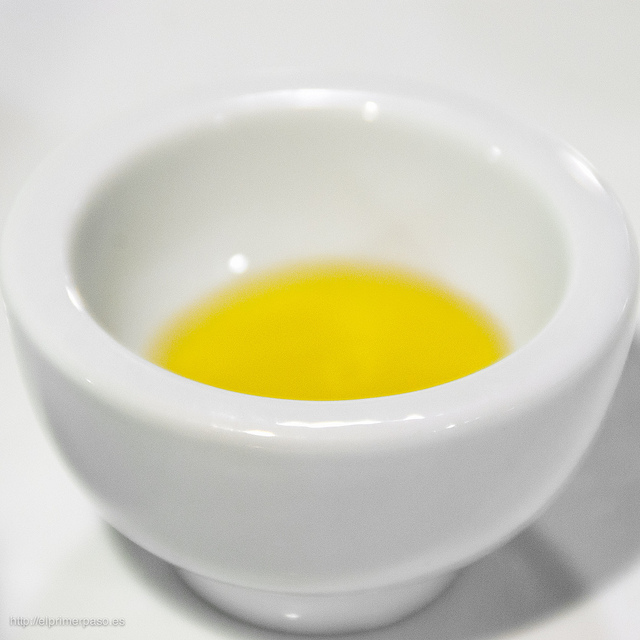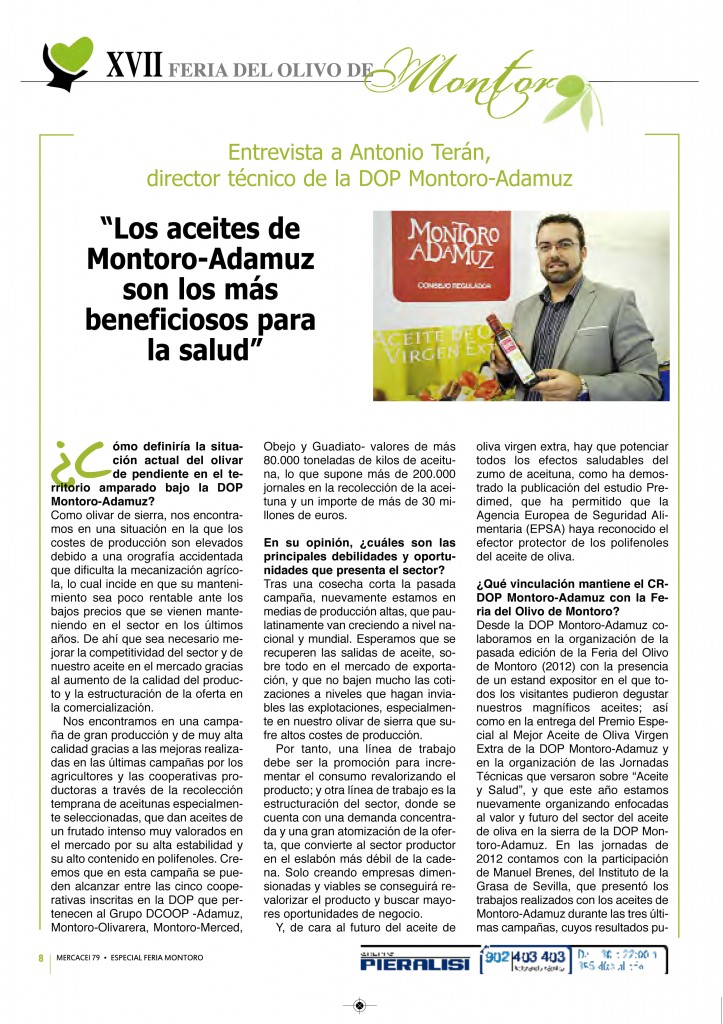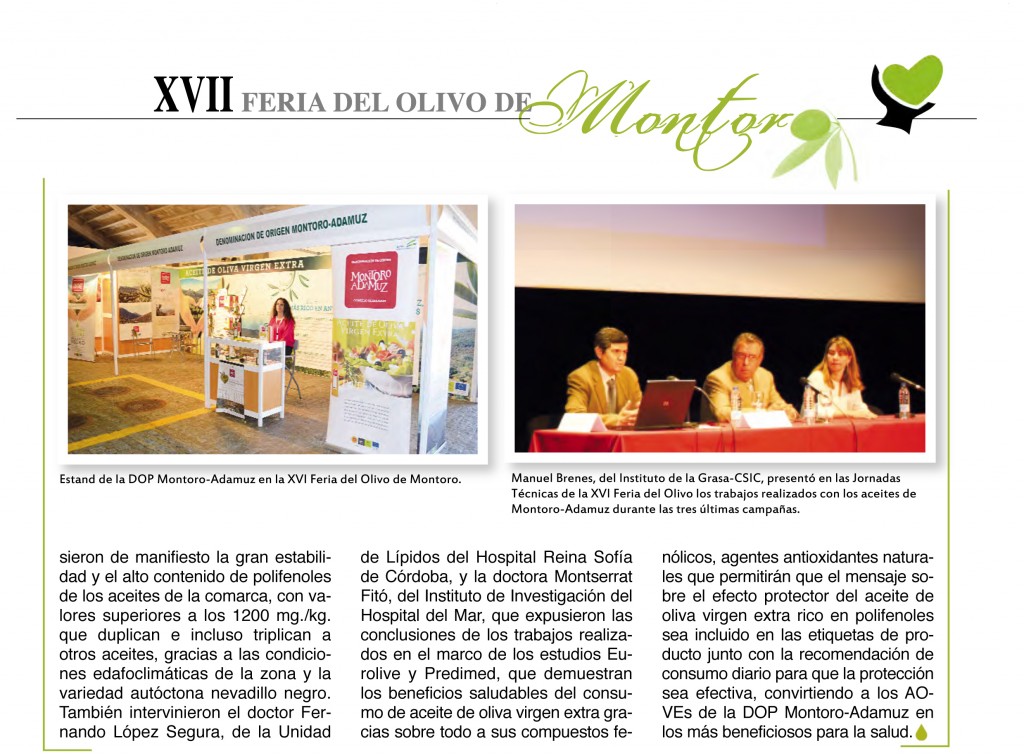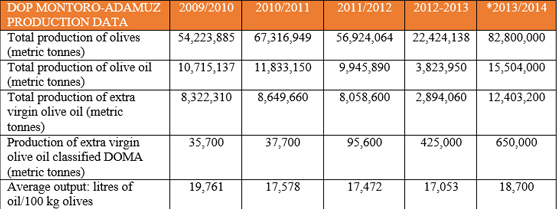Tag Archives: estudios aceite oliva
(Español) AOVE antiinflamatorio natural
(Español) Beneficios saludables del AOVE DOP Montoro-Adamuz
(Español) Oleocanthal inhibe la agregación plaquetaria
(Español) Aceites de oliva y mayor esperanza de vida
Video Jornadas Técnicas sobre Aceite y Salud DOP Montoro-Adamuz 2015
El Consejo Regulador de la Denominación de Origen Montoro – Adamuz organiza las “III Jornadas Técnicas sobre Aceite y Salud” que se enmarcan en la Feria del Olivo de Montoro. La DOP Montoro- Adamuz sigue apostando por la producción de aceites de oliva, ricos en polifenoles, actores principales de la dieta mediterránea, que sean referentes en salud y calidad. En este video se reflejan las conclusiones de los ponentes el doctor Ramón Estruch y el doctor Pérez Gimenez y la importancia de los nuevos caminos que abrirá la investigación sobre las propiedades de los polifenoles y la reflexión que tendrá que hacer el sector para producir aceites de oliva más saludables.
El AOVE contra la enfermedad intestinal inflamatoria
Entre los recientes descubrimientos sobre los efectos beneficiosos del AOVE y en concreto de sus principios bioactivos y de los polifenoles en particular tenemos resaltar el efecto sobre los procesos inflamatorios que afectan al tubo digestivo. Entre estas enfermedades podemos destacar la Colitis Ulcerosa y la Enfermedad de Crohn. Ambas desarrollan un proceso inflamatorio crónico que normalmente es tratado con antiinflamatorios y anticuerpos dirigidos contra las citocinas proinflamatorias.
El tratamiento actual no cura la enfermedad de la que se desconoce su origen, actualmente se cree que puede ser desencadenada por la infección de algún virus o bacteria no identificado. Por ello es muy difícil buscar un tratamiento efectivo. En la búsqueda de soluciones eficaces se ha investigado el efecto que la dieta tiene sobre estos pacientes. La mayoría de estos estudios se han realizado sobre animales, y en concreto en la Revista Food & Nutrition trata el tema y la conclusión que se deriva es que la mayoría de los polifenoles inhiben las manifestaciones de estas enfermedades ayudando a regular la inflamación y otros parámetros relacionados con la misma.
Algunos componentes fenólicos del aceite de oliva virgen extra como la oleuropeina, hidroxitirosol o el tirosol han demostrado su eficacia en la inflamación intestinal en ratas mejorando otros parámetros. Otro de los estudios concluye que el AOVE también podría ser beneficioso contra la colitis ulcerosa.
Los aceites de oliva virgen extra ricos en polifenoles son los mas beneficiosos para la salud. Complementar una dieta mediterránea equilibrada, con un aove rico en polifenoles y principios bioactivos es muy recomendable ya que ayuda a prevenir multitud de efermedades. En la Denominación de Origen Protegida Montoro – Adamuz llevamos más de 7 años trabajando en esta línea, produciendo los aceites más ricos en polifenoles y por ende fuente natural de salud.
Fuentes:
http://www.infaoliva.com/documentos/boletines/RESUMEN%20DE%20PRENSA%20%20%2026.5.2015.pdf
http://www.ideal.es/jaen/jaen/201505/25/aove-beneficioso-enfermedad-intestinal-20150524195026.html
http://www.cmed.es/enfermedad-inflamatoria-intestinal.php
http://elpais.com/elpais/2015/05/11/ciencia/1431355310_796945.html
El aceite de oliva remedio contra el Parkinson
Ana Rosa Cañuelo Navarro profesora del departamento de Biología Experimental de la Universidad de Jaén e integrante del grupo de investigación “Estrés Celular y Edad” presentó dentro del marco de Expoliva 2015 una investigación que está analizando el efecto neuroprotector de los polifenoles del olivo en la enfermedad de Parkinson.
 El aceite de oliva virgen extra es único entre los aceites vegetales debido a la elevada concentración de compuestos fenólicos que posee, entre los que se incluyen hidroxitirosol, tirosol, oleuropeína, ácido 4-hidroxifenilacético y ácido cafeico, entre otros. Aunque cada vez son más los estudios que ponen de manifiesto las propiedades anticancerígenas, antiinflamatorias, bactericidas y cardioprotectoras de estos compuestos, el interés por sus efectos sobre el envejecimiento o en enfermedades neurodegenerativas es más reciente y existen menos estudios al respecto.
El aceite de oliva virgen extra es único entre los aceites vegetales debido a la elevada concentración de compuestos fenólicos que posee, entre los que se incluyen hidroxitirosol, tirosol, oleuropeína, ácido 4-hidroxifenilacético y ácido cafeico, entre otros. Aunque cada vez son más los estudios que ponen de manifiesto las propiedades anticancerígenas, antiinflamatorias, bactericidas y cardioprotectoras de estos compuestos, el interés por sus efectos sobre el envejecimiento o en enfermedades neurodegenerativas es más reciente y existen menos estudios al respecto.
En concreto el grupo “Estrés Celular y Edad” ha demostrado que uno de estos fenoles simples en concreto el tirosol, puede retrasar el envejecimiento y aumentar la longevidad en un modelo animal mediante la modulación de rutas de señalización específicas. El proyecto se centra en la investigación de los efectos principales de los agentes fenólicos procedentes del olivo cuando se agrega la proteína α-sinucleína, uno de los principales factores que influyen en el desarrollo y en la progresión del Parkinson.
La enfermedad de Parkinson (PD) es el segundo desorden neurodegenerativo en cuanto a prevalencia en la población y se caracteriza por la aparición de movimientos involuntarios, temblores, rigidez muscular y dificultades en el mantenimiento del equilibrio, como consecuencia de la pérdida de neuronas dopaminérgicas en la sustancia nigra del cerebro.
En los últimos años son bastante numerosos los estudios tanto in vitro como in vivo que investigan los efectos de distintos compuestos fenólicos para prevenir el daño neuronal en diversas patologías neurodegenerativas.
 Concretamente, en esta enfermedad algunos de estos compuestos, como la curcumina, poseen un efecto neuroprotector no sólo en modelos animales sino también en humanos. Aunque los mecanismos concretos mediante los que este tipo de moléculas ejercen su acción neuroprotectora aún no están claros, se ha sugerido que éstos podrían estar relacionados con la capacidad para neutralizar especies reactivas de oxígeno y de nitrógeno, con la regulación de rutas de señalización asociadas con la supervivencia celular y la inflamación, así como con la capacidad para inhibir la agregación de proteínas implicadas como la α-sinucleína.
Concretamente, en esta enfermedad algunos de estos compuestos, como la curcumina, poseen un efecto neuroprotector no sólo en modelos animales sino también en humanos. Aunque los mecanismos concretos mediante los que este tipo de moléculas ejercen su acción neuroprotectora aún no están claros, se ha sugerido que éstos podrían estar relacionados con la capacidad para neutralizar especies reactivas de oxígeno y de nitrógeno, con la regulación de rutas de señalización asociadas con la supervivencia celular y la inflamación, así como con la capacidad para inhibir la agregación de proteínas implicadas como la α-sinucleína.
La investigación sigue abriendo camino y demostrando los beneficios de los compuestos fenólicos procedentes del AOVE y de sus efectos saludables. Los aceites de oliva virgen extra de la Denominación de Origen Montoro-Adamuz son los mas ricos en polifenoles y por lo tanto fuente de salud.
Fuente el Ideal de Jaén y Olimerca
Oleocanthal the miraculous polyphenol
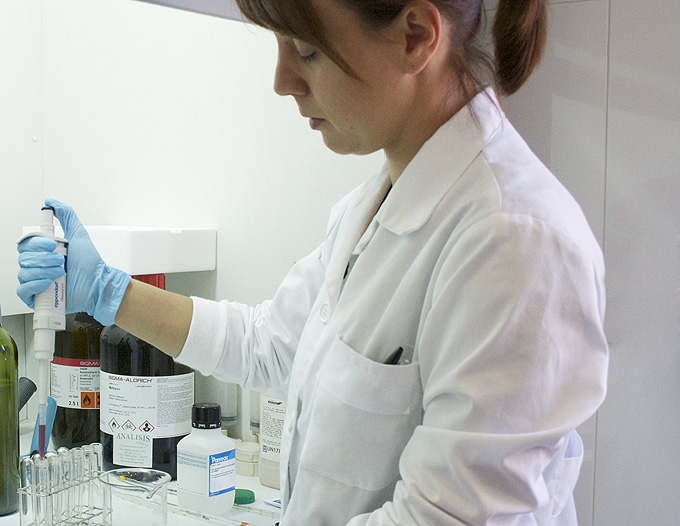 A polyphenol in extra virgin olive oil kills cancerous cells in less than an hour. A study carried out by researchers from Rutgers University and the Hunter College of the City Universityof New York in America, and published in the journal “Molecular &Cellular Oncology” demonstrates this. The polyphenol Oleocanthal OC is found in extra virgin olive oil, obtained by cold extraction at less than 27º C, as long as they are maintained at optimal conditions of preservation.
A polyphenol in extra virgin olive oil kills cancerous cells in less than an hour. A study carried out by researchers from Rutgers University and the Hunter College of the City Universityof New York in America, and published in the journal “Molecular &Cellular Oncology” demonstrates this. The polyphenol Oleocanthal OC is found in extra virgin olive oil, obtained by cold extraction at less than 27º C, as long as they are maintained at optimal conditions of preservation.
The researchers decided to study in vitro the effects of the OC on cancerous cells (pancreas, breast and prostate) and healthy cells. The cells that die suffer apoptosis, a type of suicide that lasts between 12 and 24 hours.
Oleocanthal penetrates the membrane of the cancerous cell and destroys its lysosome. This is why the study says that “attacking the stability of the lysosomal membrane offers a new approach to inducing the death of cancerous cells”.
In a high quality EVOO (Extra Virgin Olive Oil) the concentration of Oleocanthal molecules is 0.2 mg/ml, so a person weighing around 90 kg should ingest 450 mg of OC, which equates to 2.25 litres of oil. The dose used in the study with mice is very high so it is calculated that taking EVOO continuously throughout your life could have a beneficial effect on health.
 The EVOO from the P.D.O. (Protected Designation of Origin) Montoro-Adamuz, according to the results obtained in the latest studies by the Institute of Fats and Fat Derivatives in Seville and the Predimed study, are the EVOO that contain the highest quantity of polyphenols and therefore are the most beneficial to health.
The EVOO from the P.D.O. (Protected Designation of Origin) Montoro-Adamuz, according to the results obtained in the latest studies by the Institute of Fats and Fat Derivatives in Seville and the Predimed study, are the EVOO that contain the highest quantity of polyphenols and therefore are the most beneficial to health.
The combination of factors such as the altitude of the olive grove, the extreme soil and climatic characteristics of the geographical area, together with the endemic variety of the native picual “Nevadillo Negro” olive gives the extra virgin olive oils from the P.D.O. Montoro-Adamuz an exceptionally high quality and makes them the richest in thesephenolic components and therefore rich in Oleocanthal OC.
Sources:
EVOO Montoro-Adamuz – Scientifically demonstrated health benefits
EVOO PDO Montoro-Adamuz – scientifically demonstrated health benefits
The oil from the PDO Montoro-Adamuz is a natural source of health benefits thanks to its high content of bioactive substances.
We have good news about the EVOO from the PDO Montoro-Adamuz!
Research studies demonstrate that “EVOO from PDO Montoro-Adamuz is very beneficial to health”.
Manuel Brenes of the Institute of Fats and Fat Derivatives (IG-CSIC) in Seville gave a presentation at the 28th EFFoST International Conference,heldtogether with the 7th International Food Factory for the Future Conferencewhich took place from 25th to 28th November 2014 at Uppsala Konsert & Kongress (Sweden), under the theme“Innovations in attractive and sustainable food for health”.This has shown, from the studies carried out over the last six seasons, the high content of bioactive compounds in the extra virgin olive oils from the PDO Montoro-Adamuz.
The consumption of extra virgin olive oil is not only highly recommendable for human health due to the high content of fatty acids in its composition, but it is also very beneficial thanks to its content of minor compounds such as phenols, tocopherols, sterols, squalene and others. However, the concentration of these substances in EVOO depends on the type of olives cultivated, the agricultural conditions and the processing methods, among other factors. In this study, thebioactive compounds in EVOO from the PDO Montoro-Adamuz were analysed for various components, in particular phenolic compounds. Similarly, the influence of the location of the olive trees (sunny or shady area) and the content of these substances in the oils were also examined.
The conclusion drawn from this study is thatthe EVOO from the PDO Montoro-Adamuz are very rich in bioactive substances such as oleic acid, sterols, squalene and tocopherols in particular, and they possess a high concentration of phenolic compounds(>700mg/kg)which can be attributed to the extreme agricultural and climatic conditions, the varieties of olive (Picual and Nevadillo Negro) and the early harvesting of the fruit.
This positions the EVOO from the PDO Montoro-Adamuz as the only Protected Designation of Origin whose EVOO has had these components analysed over six years and have scientific evidence of being very healthy.
Oleocanthal, an exciting discovery
The best discoveries sometimes happen due to a coincidence or intuition.
This is the case with the American biologist Gary Beauchamp, discoverer of Oleocanthal, a molecule present in extra virgin olive oil with a strong anti-inflammatory effect.
It turns out that Beauchamp, who gave a speech at the Council of Cordoba on 21st November, invited by the Oleocanthal Society of Andalusia, QVExtra International Association and the Spanish Association of Olive Municipalities, owes this great discovery to chance.
While in Sicily for work he tried the olive oil and detected a flavour similar to that of ibuprofen. This simple perception was the chance start of research that has revealed some extremely surprising data.
The Oleocanthal molecule, present in extra virgin olive oil, has an anti-inflammatory power comparable to that of the non-steroidal inhibitor known as ibuprofen, one of the most widely used drugs worldwide. However, there is one difference between them: Oleocanthal has no side effects for health.
This news is even better if we take into account its role in the prevention of rheumatic illnesses, cardiac disorders, respiratory problems, Alzheimer’s, etc.
However, not all extra virgin olive oils contain the same proportion of Oleocanthal. This depends on many conditioning factors that at first sight seem insignificant in the eyes of non-experts: the quality of the production, the harvesting dates and the types of olive.
In our country, and of course in the PDO Montoro-Adamuz, we can feel very proud as Spain is the main producer of this type of extra virgin olive oil.
Oleocanthal has been added to the long list of health benefits of our oil, something that is demonstrated in the study we carried out in 2008 on the level of polyphenols in our extra virgin olive oils. These have a high content of phenols, much higher than, in some cases three times more than, those in other oils on the market.
(Image from Andreas Levers)
San Andrés Olive Tourism Route
Montoro-Adamuz in Gastronight Cordoba
All of us who have tried the gastronomic products from Cordoba (and those of us who are lucky enough to enjoy them every day) know that they are of excellent quality. However, this positioning has been achieved thanks to the choice of Cordoba as Ibero-American Capital of Gastronomic Culture.
Within the activities programmed to celebrate this honour, this weekend an event of special importance will take place and PDO Montoro-Adamuz has the honour of being part of it: Gastronight Cordoba.
During the evening of Friday 12th September, Cordoba will enjoy its own products more than ever in what will be an unforgettable festival of gastronomy.
Designed to be a tribute to the Cordoban designations of origin (PDO Montoro-Adamuz, PDO Baena, PDO Priego de Córdoba, PDO Aceite de Lucena, PDO Los Pedroches and PDO Montilla-Morilles), Gastronight offers those attending a series of gastronomic routes through 200 of the city’s restaurants.
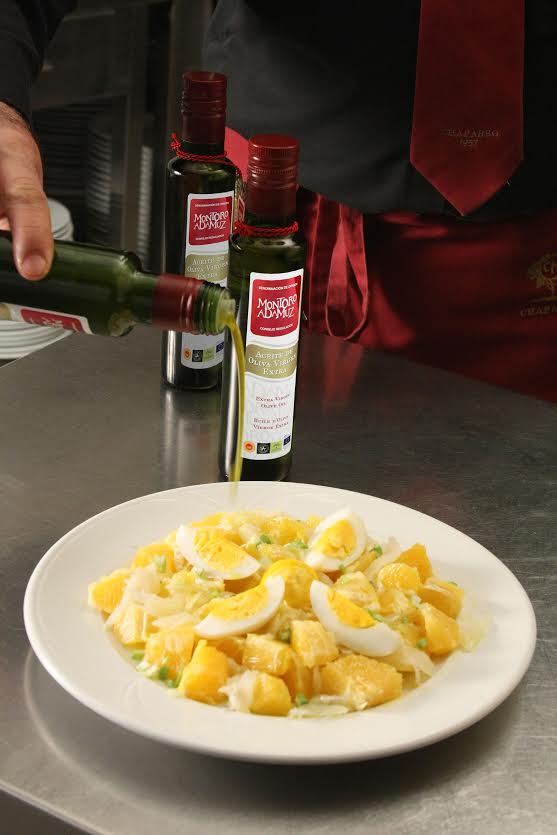 As the other participating designations of origin, PDO Montoro-Adamuz will have its own marquee in the Plaza de Las Tendillas in Cordoba where those taking part will be able to taste our excellent extra virgin olive oil.
As the other participating designations of origin, PDO Montoro-Adamuz will have its own marquee in the Plaza de Las Tendillas in Cordoba where those taking part will be able to taste our excellent extra virgin olive oil.
This is the starting point for the “Montoro-Adamuz Route”, which passes through the streets: Sevilla, Málaga, Plaza Emilio Luque, Plaza San Juan, Valladares, Fernández Ruano, Puerta Almodóvar, Almanzor, Plaza Cardenal Salazar and Romero. Along the way the public can stop off at participating establishments and taste the best recipes prepared with extra virgin olive oil.
In addition, those who wish to do so can register in our marquee for the “Discover the origin of extra virgin olive oil” tasting, in which the four designations of origin of oil in the province of Cordoba will participate.
Undoubtedly the gastronomy of our region owes a lot to olive oil, and not just the unmistakable flavour and aroma that it gives to dishes. The extra virgin olive oil from the PDO Montoro-Adamuz is a very specific oil from the sensory viewpoint and has great aromatic complexity; being the result of a natural blend of the Picual variety and the native Nevadillo Negro.
It also provides our gastronomy with countless highly beneficial properties such as the high content of polyphenols in our oil, which make it one of the healthiest foods in our diet.
10 benefits of extra virgin olive oil
“Let food be your medicine and medicine your food” (Hippocrates).
This popular quote from one of the most famous doctors in Ancient Greece could well be the slogan for PDO Montoro-Adamuz as each day new studies are published showing the healthbenefits ofextra virgin olive oil, and especially theirhigh content of polyphenols.
So today we want to summarise many of the things that, over time, we have been telling you about in this blog,listing the main benefits of extra virgin olive oil:
- Good for the heart
Various studies, including the PREDIMED Study, demonstrate that eating foods with a high content of polyphenols, such as extra virgin olive oil, may reduce by 30% the risk of suffering from cardiovascular illnesses (such as a heart attack or stroke), which unfortunately are the leading cause of death worldwide.
- Helps fight breast cancer
For some time it has been known that the incidence of breast tumours is lower in countries in the Mediterranean basin, where olive oils are an essential part of the diet. On this basis, the Multidisciplinary Group for the Study of Breast Cancer at the Autonomous University of Barcelona (UAB) prepared a study which has demonstrated that the consumption of extra virgin olive oil reduces the malignancy of breast cancer and also slows the growth of tumours.
- Prevents diabetes
Recently, the PREDIMED (Prevention with Mediterranean Diet) Study revealed the conclusions of a project which investigated the relationship between the Mediterranean diet and the risk of developing diabetes. The results could not have been more positive: a diet rich in extra virgin olive oil reduces the chance of developing diabetes by 40%. (More info)
- Improves circulation
The consumption of an extra virgin olive oilrich in polyphenols has important benefits for the circulatory system. According to a study carried out by the Lipids and Atherosclerosis Unit at the Reina Sofía Hospital, this consumption improves the levels of blood factors, reducing, among others, the risk of thrombosis. (More info)
- Combats ageing
Thanks to its high content of polyphenols and vitamin E, which are natural antioxidants, extra virgin olive oil contributes to preventing the damage caused by the free radicals in the body tissue, the main cause of ageing. Foods like olive oil, vegetables and red wine, rich in polyphenols, help to neutralise those free radicals.
- Helps to prevent Alzheimer’s
Precisely due to the action of its antioxidant agents, olive oil protects against cognitive deterioration, preventing the development of neuro-degenerative dementias and Alzheimer’s disease.
- Good for muscular functions
Although preliminary, the results from a recent study by the Laboratory of Biochemical Genetics at the University of Zaragoza are more than encouraging. The main conclusion is that the consumption of a 119 gram dose of extra virgin olive oileach day can improve motor and muscular behaviour. The experiment was conducted on mice but it is expected that this study can be conducted on humans, which could be a breakthrough in the fight against illnesses such as Amyotrophic Lateral Sclerosis. (More info)
- Good cholesterol
Oleic acid is a monounsaturated fat that lowers “bad” cholesterol (LDL, something that hinders the circulation of blood to the heartif it builds-up on the artery walls) and increases the levels of “good” cholesterol.
The good cholesterol, from high density lipoproteins (HDL), is produced naturally in our body and collects the unused cholesterol and directs it to the liver, where it is eliminated. To increase the levels of this cholesterol there is nothing better than consuming food with a high content of oleic acid, such as olive oil.
- Reduces hypertension
Due to its vasodilation action, the consumption of monounsaturated fats such as olive oil improves the flow of blood and therefore reduces the possibility of developing hypertension; as it regulates blood pressure.
- Helps our digestive system
Extra virgin olive oil contributes to the proper functioning of our digestive system, being considered as a protector against excess stomach acid. It also facilitates the absorption of calcium and magnesium.
If all the benefits of olive oil that we have just told you about don’t seem to be enough, we will give you one more: it makes all your dishes even tastier!
EVOO: Another step in the fight against Amyotrophic Lateral Sclerosis
Report in Mercacei
The latest issue of Mercacei Magazine has a special report on the 17th Montoro Olive Tree Trade Fair, in which, as you know, PDO Montoro-Adamuz has a particularly important role.
Over the six pages of this report, the publisher specialising in the olive oil industry gives a detailed description of the characteristics of the mountain olive grove which is characteristic of our PDO, situated in the municipal towns of Montoro, Adamuz, Espiel, Hornachuelos, Obejo, Villaharta, Villanueva del Rey and Villaviciosa de Córdoba.
It highlights our sustainable agricultural practices and traditional harvesting techniques which try, as many of you know, to prevent soil erosion with natural plant cover.
The report also points out the origin of the high polyphenol content of our extra virgin olive oil: “The soil and climatic conditions of the mountain olive groves, situated on acidic, poor and shallow soils, are an exception within the olive groves of southern Spain that, together with the high levels of evapotranspiration and amount of sunshine that provoke stress in the plant, lead to a high content of polyphenols in the oil”. It also adds a mention of the careful cultivation and harvesting of our fruit.
It provides an overview of the health benefits of the high content of polyphenols and antioxidant agents in our extra virgin olive oil; emphasising our work in quality certification.
The report includes an interview with our technical director, Antonio Terán, which you can read below, in which he responds to questions regarding the mountain olive grove and the industry’s prospects.
Without a doubt this report is a big boost to our efforts to promote our extra virgin olive oil, something that is fundamental for our competitiveness in the domestic and international markets.
Mercacei is one of the leading publishing groups with the greatest prestige within the industry, involving notable collaborators and experts from the world of olive oil and winningnumerous international awards for its informative work.
Quality, the key to competitiveness
 Following a short harvest last season we are glad to see the figures showing what we have already handled in this season. Although unconfirmed, the figures already look much more positive than in previous years, as can be seen from the following table.
Following a short harvest last season we are glad to see the figures showing what we have already handled in this season. Although unconfirmed, the figures already look much more positive than in previous years, as can be seen from the following table.
With these figures, we expect oil sales to recover, especially in the export market, and for prices not to fall to the levels that make the business unviable, especially in our quality segment. While quality is the key to competitiveness it leads to high production costs.
Just looking at the five cooperatives from the DCOOP Group, registered in the PDO Montoro-Adamuz (Coop. Agr. Ntra Madre del Sol, Olivarera de Montoro, Coop. Oliv. Ntra. Sra. de la Merced, Olivarera del Guadiato and Coop. del Campo San Antonio Abad) we have figures of more than 80,000 tonnes of olives. This represents more than 200,000 daily wages in the harvest and an income of more than 30 million euros.
Of these figures, around 50% corresponds to the activity of the Coop. Agr. Ntra. Madre del Sol which has also obtained high quality olive fruit of an intense green, highly valued in the market due to their good stability and high content of polyphenols.
All of this has been possible thanks to the improvements made over the last two years in the reception and milling of the olives from our production cooperatives.
The quality of the oil depends not only on the quality of the fruit, but also on caring for it throughout the entire oil production process. Mishandling the olive in the field or in the mill may damage it and lower the category of the oil. Therefore, the farmer and the oil mill are key to the quality of extra virgin olive oil.
At PDO Montoro-Adamuz, therefore, one of our functions is to strengthen the structure of our cooperatives, focusing on the control and improvement of the production quality. However, another of our commitments must be promotion, in order to enhance the value of the product, guaranteeing its origin and quality.
Only with viable and structured companies will we be able to increase the value of our product, which will in turn open the door to export markets (a path that we have already begun to take and that is providing great results).
Long live the Mediterranean diet
Today in our blog we want to highlight the results of two recent pieces of research that have come out of the PREDIMED Study, which we have already spoken about at times.
The reason for choosing these two pieces of research is that both have come to similar conclusions which are very encouraging in terms of human health: a diet rich in polyphenols, such as the Mediterranean diet (based on extra virgin olive oil) contributes to reducing mortality.
The first of these pieces of research is the one that has been coordinated by Doctor Rosa Mª Lamuela, director of the Natural Antioxidants Research Group at the Department of Pharmacy at the University of Barcelona. This has also involved researchers from Rovira i Virgili University (URV).
In this research, which forms part of the doctoral thesis of Ana Trasserra, there has been further analysis of the data provided by the PREDIMED study, which studied people aged between 55 and 80 with cardiovascular risks.
The resulting figures could not have been more positive: this researcher found that the mortality rate (due to cardiovascular diseases or otherwise) of those people who had followed a diet rich in polyphenols was much lower than among the people who had not followed a similar diet.
After her analysis, she also highlighted that certain types of polyphenols were responsible for this reduction in mortality: first we have the stilbenes, present in grape skin and concentrated in red wine; and second we have the lignans found in foods such as olives, sesame and flax seeds and whole grains.
Doctor Lamuela explained that “in other populations studied previously, the consumption of any of the foods rich in polyphenols was not sufficient in itself to reduce mortality, but in our study the consumption of polyphenols was examined more widely, coming from different food sources”. In other words, consuming a variety of types of polyphenols is the key to increasing our life expectancy.
The second study that we want to tell you about focuses specifically on the relationship between the different types of olive oil and the risk of cardiovascular disease, and has been undertaken by the same research groups, although coordinated in this case by Jordi Salas Salvadó, professor at the URV.
This study reveals that if the daily consumption of extra virgin olive oil is increased by 10 grams, mortality due to cardiovascular problems is reduced by 10%. Among the oils, extra virgin olive oil is the best quality due to having a high content of polyphenols, a feature of the oil from the PDO Montoro-Adamuz.
Without a doubt these are two good news stories that once again make us proud of our oil, one of those with the highest content of polyphenols, and make us want to say “Long live the Mediterranean diet!”, as it lengthens our lives.
Course on the Sensory Analysis of Extra Virgin Olive Oil
One of the professional activities carried out in the framework of the 17th Montoro Olive Tree Trade Fair, and one of the most popular this year, was the Course on the Sensory Analysis of Extra Virgin Olive Oil.
A group of 25 students, consisting of millers and experts from the region’s cooperatives, attended this course at the Hotel Mirador in Montoro.
 The first day, 14th May, was led by Brígida Jiménez Herrera, director of theAndalusian Institute of Agricultural and Fisheries Research and Training (IFAPA) in Cabra, who spoke to the participants about the organoleptic properties of extra virgin olive oil. There was then a tasting of international oils and another of the different varieties and blends of oil.
The first day, 14th May, was led by Brígida Jiménez Herrera, director of theAndalusian Institute of Agricultural and Fisheries Research and Training (IFAPA) in Cabra, who spoke to the participants about the organoleptic properties of extra virgin olive oil. There was then a tasting of international oils and another of the different varieties and blends of oil.
The person responsible for running the second day of the tasting course was José María Horcas, head of the laboratory panel at DCOOP. He explained to the participants the features and characteristics of the extra virgin olive oil from the PDO Montoro-Adamuz and the DO Antequera. After his presentation the students took part in a tasting of the olive oils from those designations of origin.
3rd Technical Workshop of the PDO Montoro-Adamuz
With the involvement of more than 200 people, the 3rd Technical Workshop of the PDO Montoro-Adamuz has been one of the highlights of the 17th Montoro Olive Tree Trade Fair (held from 14th to 17th May 2014). In this edition it focused on the values and future of extra virgin olive oil in our designation of origin.
The first presentation in these workshops, dedicated to professionals from the olive industry, was given by the renowned Doctor Ramón Estruch from the University of Barcelona, manager and coordinator of the PREDIMED Study about the effects of the Mediterranean diet on the prevention of cardiovascular diseases. During his presentation he emphasised the conclusions of this study, which show the benefit of consuming extra virgin olive oil, making it clear that “4 or 5 tablespoons per day does not make you gain weight, but rather improves both good and bad cholesterol”.
Moreover, Teresa Pérez Millán, manager of the Interprofesional del Aceite de Oliva organisation, stressed that the level of polyphenols in extra virgin olive oil is what provides its health benefit. In that regard, she highlighted the advantages of the oil from our designation of origin, one of the richest in polyphenols.
Additionally, Pérez Millán noted the need to promote extra virgin olive oil to tourists in order for them to “appreciate our product”, highlighting the different campaigns being carried out by the “Aceites de España” brand throughout the world.
One of the central themes of the technical workshops was undoubtedly the issue surrounding the Common Agricultural Policy (CAP) and mountain olive groves with natural difficulties, a theme that Rafael Sánchez de Puerta, chairman of the EU Olive Oil Advisory Group, addressed in his speech.
Sánchez de Puerta argued that the “CAP must have a better outlook” and said that to achieve this it will be “essential to develop the Rural Development in Andalusia programme”. As he mentioned, this programme will have a budget of 1,900 million and will be managed by the Rural Development Groups (RDG) of Andalusia, who will surely be committed to the mountain olive grove, one of the hardest hit. He continued by saying that “this type of policy, which covers the period between 2014 and 2020, could be implemented from next year”.
During his presentation, Sánchez de Puerta also emphasised the need for the involvement of companies that position our products in the international market. He stressed that two thirds of the olive grove production is already exported across the world, exceeding our main competitor, Italy. In this regard, he focussed on turning farmers into entrepreneurs through cooperatives, in order to strengthen industrialisation, commercialisation and, therefore, the growth of the industry.
In addition to the aforementioned presentations, others were given by renowned researchers and professionals from industries related to extra virgin olive oil, such as Doctor Francisco Pérez Jiménez, from the lipids unit of the Reina Sofía Hospital in Cordoba.
Similarly, during the technical workshops, those who took part were able to enjoy a healthy breakfast based, of course, on extra virgin olive oil.


